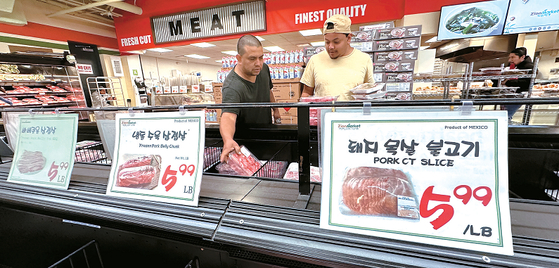Pork prices are steeply rising as Proposition 12 has taken effect this year after a moratorium.
According to the USDA, the average wholesale price for domestic pork soared from $2.50 per pound in early January to $3.55 earlier this month, marking a 42% increase within just one month.
“Many of the existing suppliers are withdrawing from the market as regulations under California’s animal welfare law prohibit the sale of pork that has not been raised in accordance with new regulations,” said a Korean-American meat wholesaler, adding that prices are going up as supplies are scarce. According to industry experts, there are only a limited number of brands currently available in the Korean-American market industries that comply with the new law.

Fluctuating wholesale pork prices are directly affecting consumer costs. Additionally, the price for imported pork belly from Mexico and Canada surged over 50% year-on-year, attributed to the animal welfare law’s implementation.
The Korean market industry in LA reports a retail pork price increase of 50 cents to $1 per pound over the last month. Prices now range from $4.99 to $5.99 per pound for pork shoulder, $7.99 to $8.99 for pork belly, $8.49 to $8.99 for black pig pork belly, and $5.99 for pork back ribs.
“Although the wholesale price of pork is increasing slightly every week, we cannot immediately reflect it in our selling price, which reduces our margins,” said Zion Market at Vermont store manager John Yoon. “Recently, we have seen a noticeable increase in customers looking for frozen pork belly accordingly, which is half the price of fresh pork belly.”
Before the enforcement of the new law, fresh pork belly was priced at under $10 per pack, but it has since increased from $8.49 to $8.99 per pound. The Muji Fuji pork belly, previously $9.99 per pound, now costs between $15 to $20 per pack. Conversely, frozen pork belly remains significantly cheaper, at $4.99 per pound in Korean markets.
Proposition 12’s impact extends beyond consumers to the entire national pig and pork supply chain. Pork producers nationwide must adhere to these new regulations to access California’s market, which represents 13% of the U.S. pork demand.
“To raise pigs while complying with the state’s animal welfare laws means that the producer cost is going up,” the National Pork Producers Council (NPPC) said, “with a tight profit margin, higher raising costs mean higher prices for consumers.”
Todd Marotz, a Minnesota pig farmer, said, “Currently, only 20 percent of our farms meet California’s regulations.” “For producers to comply with the law, the cost of energy bills, labor, and other infrastructural costs will increase, inevitably driving pork prices higher.”
Proposition 12 mandates that California pork suppliers provide at least 24 square feet of space per pig. Sales of meat from pigs raised in tighter conditions are prohibited. Although pork producers contested Proposition 12’s constitutionality in the California Supreme Court, the state prevailed last May.
BY EUNYOUNG LEE, HOONSIK WOO [lee.eunyoung6@koreadaily.com]





